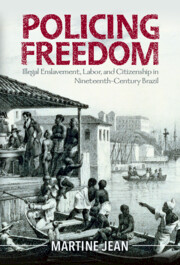Book contents
- Policing Freedom
- Afro-Latin America
- Policing Freedom
- Copyright page
- Dedication
- Contents
- Figures
- Maps
- Tables
- Acknowledgments
- Introduction
- 1 The Politics of Slavery, Race, Nation, and Prison Building
- 2 Confinement, Labor, and Citizenship
- 3 Prison Labor and the Politics of Slavery
- 4 Disciplining Children and Engendering Racialized Citizenship
- 5 Adelino Mwissicongo and the Afterlife of Emancipation
- Conclusion: Slavery’s Punitive Afterlife
- Appendices
- Bibliography
- Index
3 - Prison Labor and the Politics of Slavery
Published online by Cambridge University Press: 03 August 2023
- Policing Freedom
- Afro-Latin America
- Policing Freedom
- Copyright page
- Dedication
- Contents
- Figures
- Maps
- Tables
- Acknowledgments
- Introduction
- 1 The Politics of Slavery, Race, Nation, and Prison Building
- 2 Confinement, Labor, and Citizenship
- 3 Prison Labor and the Politics of Slavery
- 4 Disciplining Children and Engendering Racialized Citizenship
- 5 Adelino Mwissicongo and the Afterlife of Emancipation
- Conclusion: Slavery’s Punitive Afterlife
- Appendices
- Bibliography
- Index
Summary
This chapter explores the entanglement of the process to inaugurate the Casa de Correção with the political crisis that culminated in the suppression of the slave trade after 1850. I argue that the inauguration of the penitentiary in 1850 belongs to the articulation of policies to restructure slavery geographically in Brazil as the country moved decisively, under considerable British pressure, to suppress the contraband slave trade. The chapter probes the July 1850 decree that regulated the Casa de Correção as Brazil’s first penitentiary. It contends that the continued utilization of unfree labor proved to be a crucial part of the campaign to repress the slave trade and the entangled processes through which authorities deployed the prison to administer the ripple effects of the ending of human trafficking. I also interrogate how administrators of the Casa de Correção struggled to implement the congregate regime for prisoners sentenced to “prison with work” while overseeing its other dependencies. This demonstrates how penitentiary labor was deeply shaped by larger societal and economic forces of the Atlantic World.
Keywords
- Type
- Chapter
- Information
- Policing FreedomIllegal Enslavement, Labor, and Citizenship in Nineteenth-Century Brazil, pp. 153 - 196Publisher: Cambridge University PressPrint publication year: 2023

